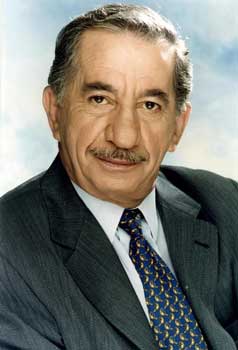Funeral for former Cypriot president Papadopoulos held in Cyprus
 Athens/Nicosia - Hundreds of mourners attended the funeral of former hardline Cypriot president Tassos Papadopoulos in Nicosia on Monday.
Athens/Nicosia - Hundreds of mourners attended the funeral of former hardline Cypriot president Tassos Papadopoulos in Nicosia on Monday.
Family, friends and politicians, among them Greek Prime Minister Costas Karamanlis and main Greek opposition leader Giorgos Papandreou paid their last respects to Papadopoulos at a service at Saint Sophia cathedral.
Papadopoulos, who led his community to reject a United Nations peace plan to reunite the divided island of Cyprus, died following a long battle with cancer on December
12. He was 74.
"He was a politician with depth and was widely respected because our society respects patriots who conscientiously serve it," said Cypriot President Dimitris Christofias.
The former Cypriot president had been suffering from lung cancer and was admitted to a hospital on November 22 where his condition quickly deteriorated.
Born Tassos Nikolaou Papadopoulos in 1934 in Nicosia and educated as a lawyer at King's College in London, he served as the President of the Republic of Cyprus from
2003 to 2008.
In 2003 he campaigned for presidential elections on a platform that he would be able to secure a better deal in the Cyprus dispute with the Turkish Cypriots than the incumbent Glafkos Clerides.
Barely a year after his election, he ushered the southern part of the island into the European Union. Peace talks were deadlocked after he led the Greek-Cypriot rejection of a UN reunification plan in a 2004 referendum. Turkish Cypriots had overwhelmingly voted in favour.
At the time Papadopoulos tearfully addressed citizens on the southern side of the island in a televised address, urging them to vote "no" to the plan. He said the UN plan, which called for a loose reunification along federal lines, largely favored Turkish Cypriots.
He lost his bid for re-election in February 2008 to former party ally Dimitris Christofias.
Within months, Christofias and Turkish Cypriot leader Mehmet Ali Talat launched a new round of peace talks. Commentators have said the leaders would likely reach a peace deal in 2009.
The island has been split since 1974 after Turkey invaded the northern third of the island in response to a short-lived coup initiated by Greece.
The ongoing conflict in Cyprus also threatens Turkey's aspirations of joining the European Union.
Ankara started EU entry talks in 2005 and the Cyprus problem has proven to be one of the main stumbling blocks in negotiations. (dpa)